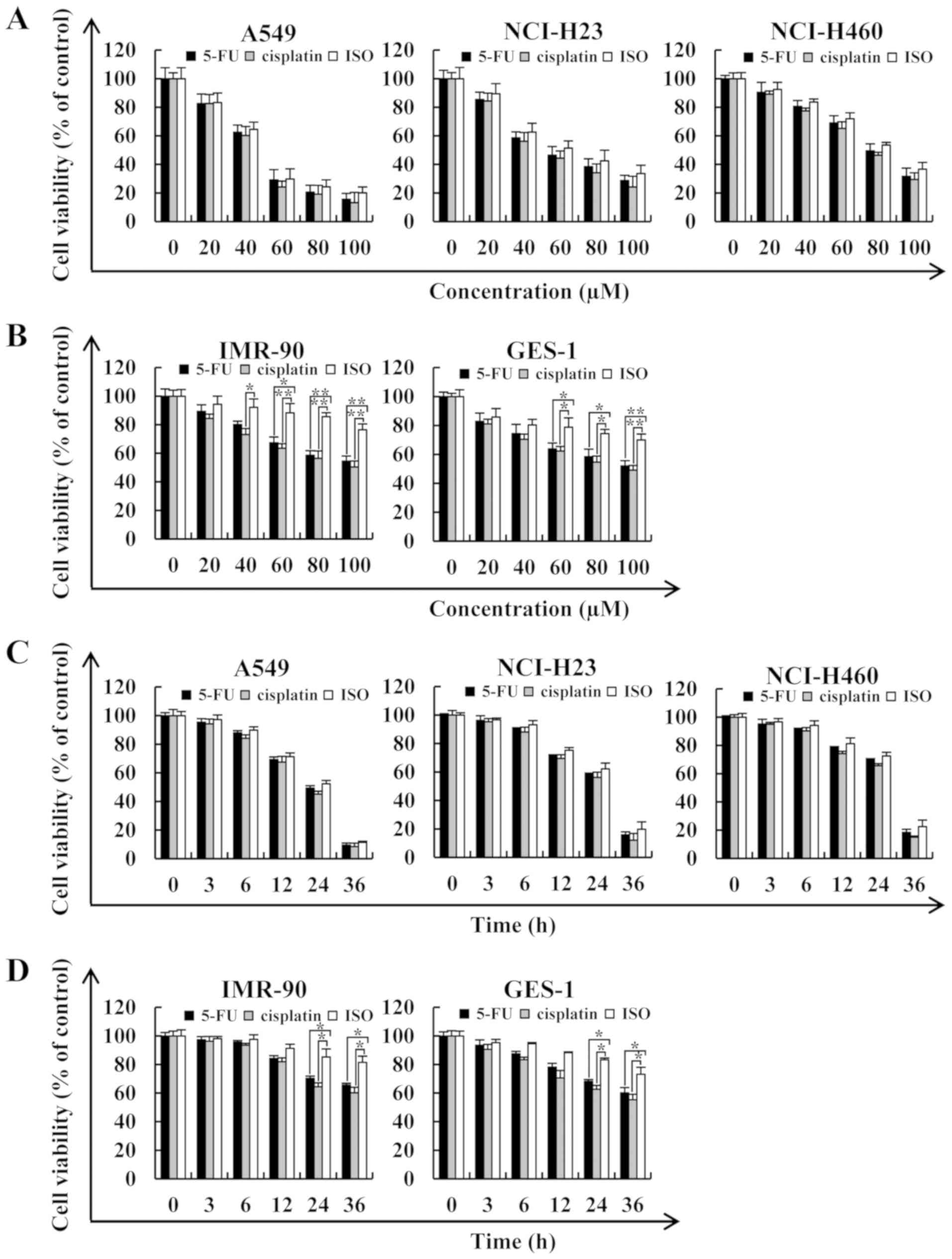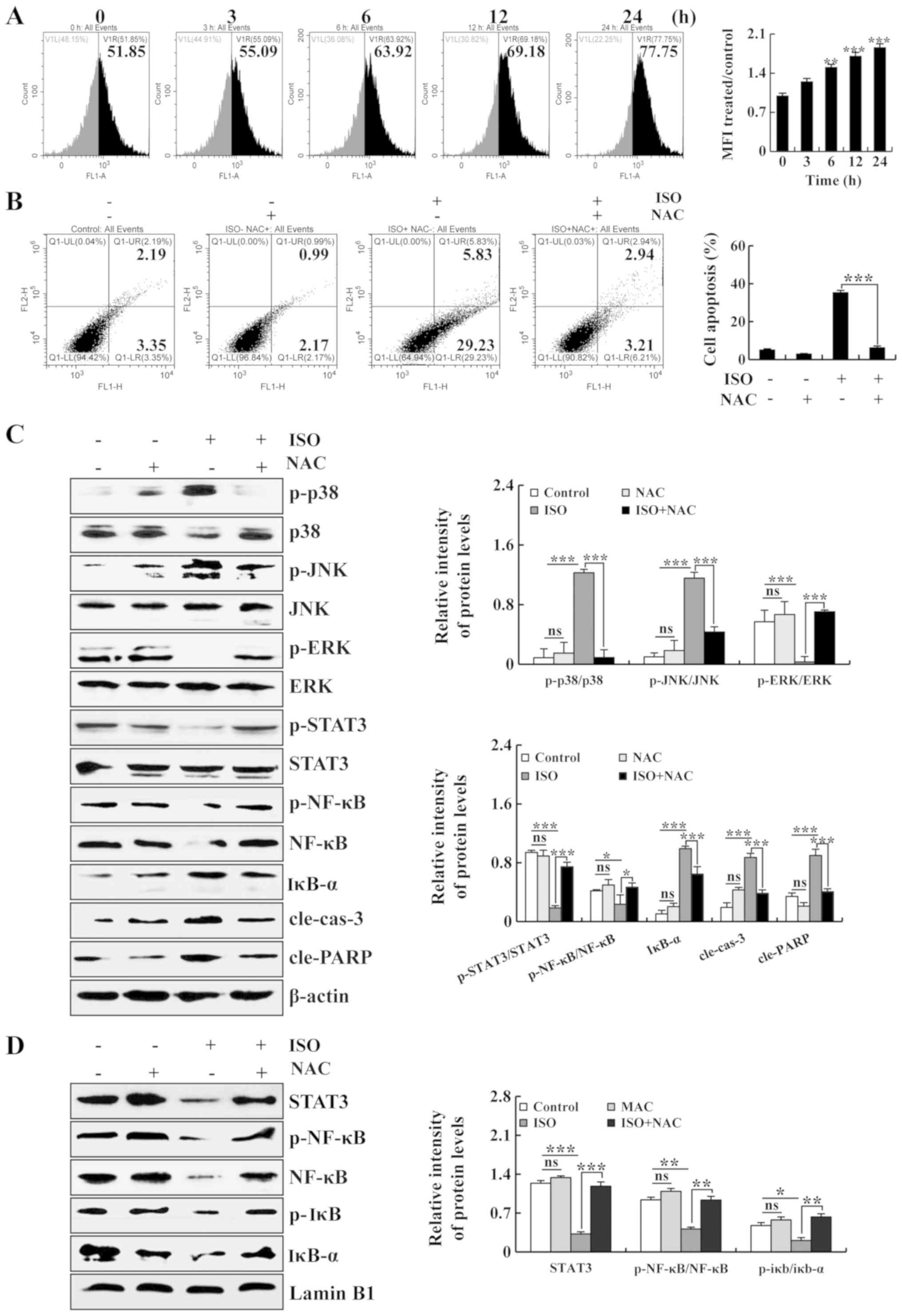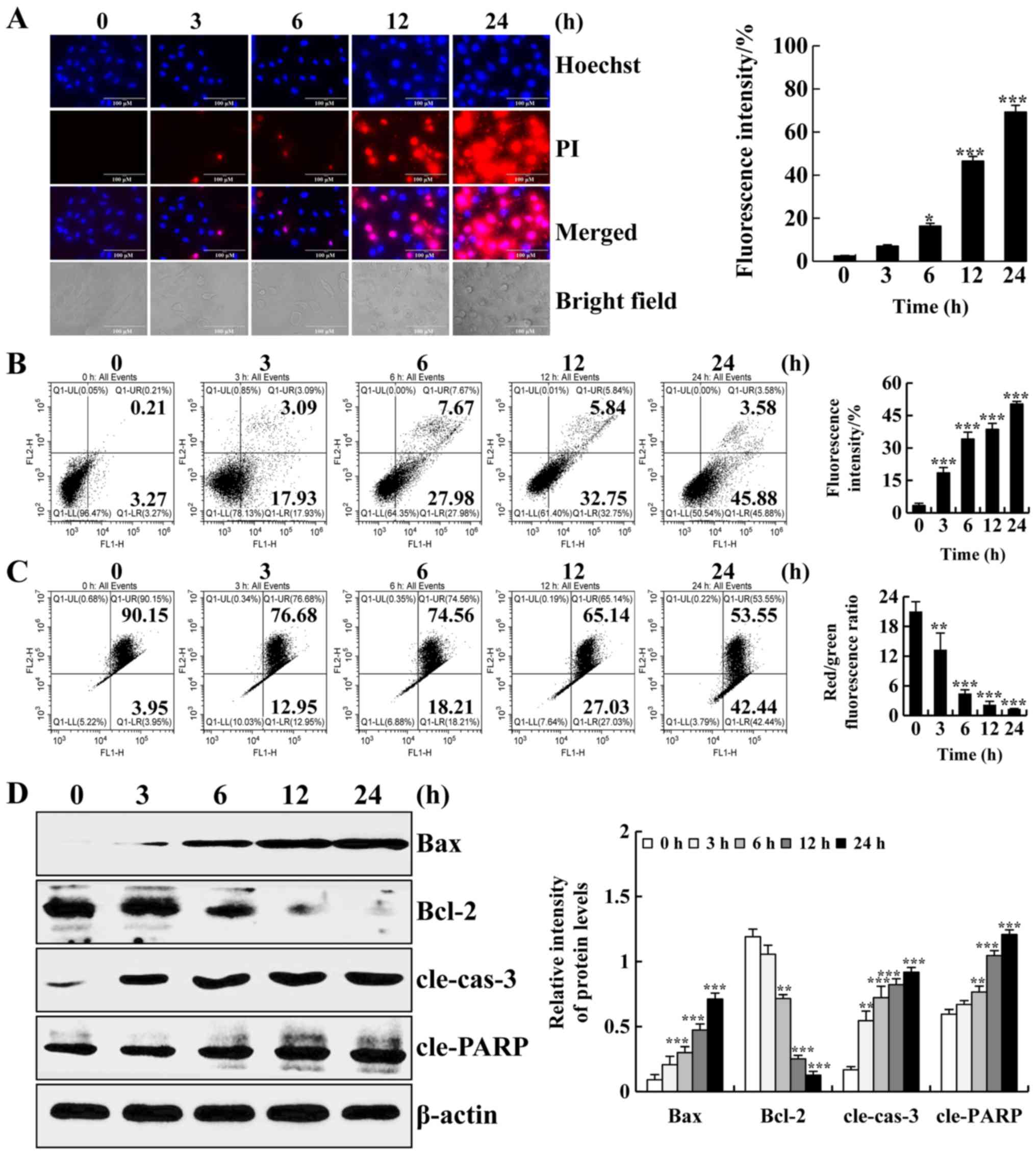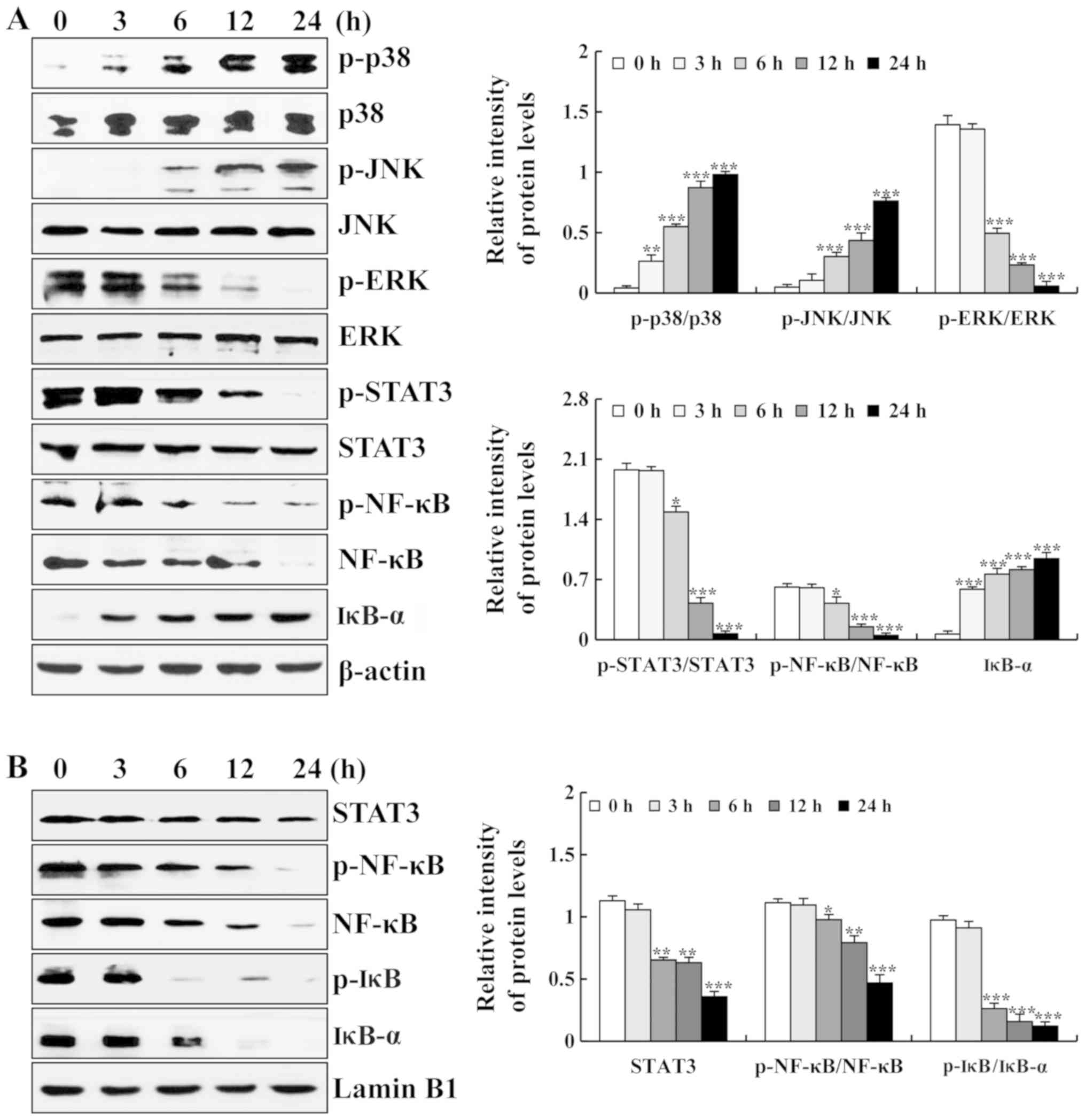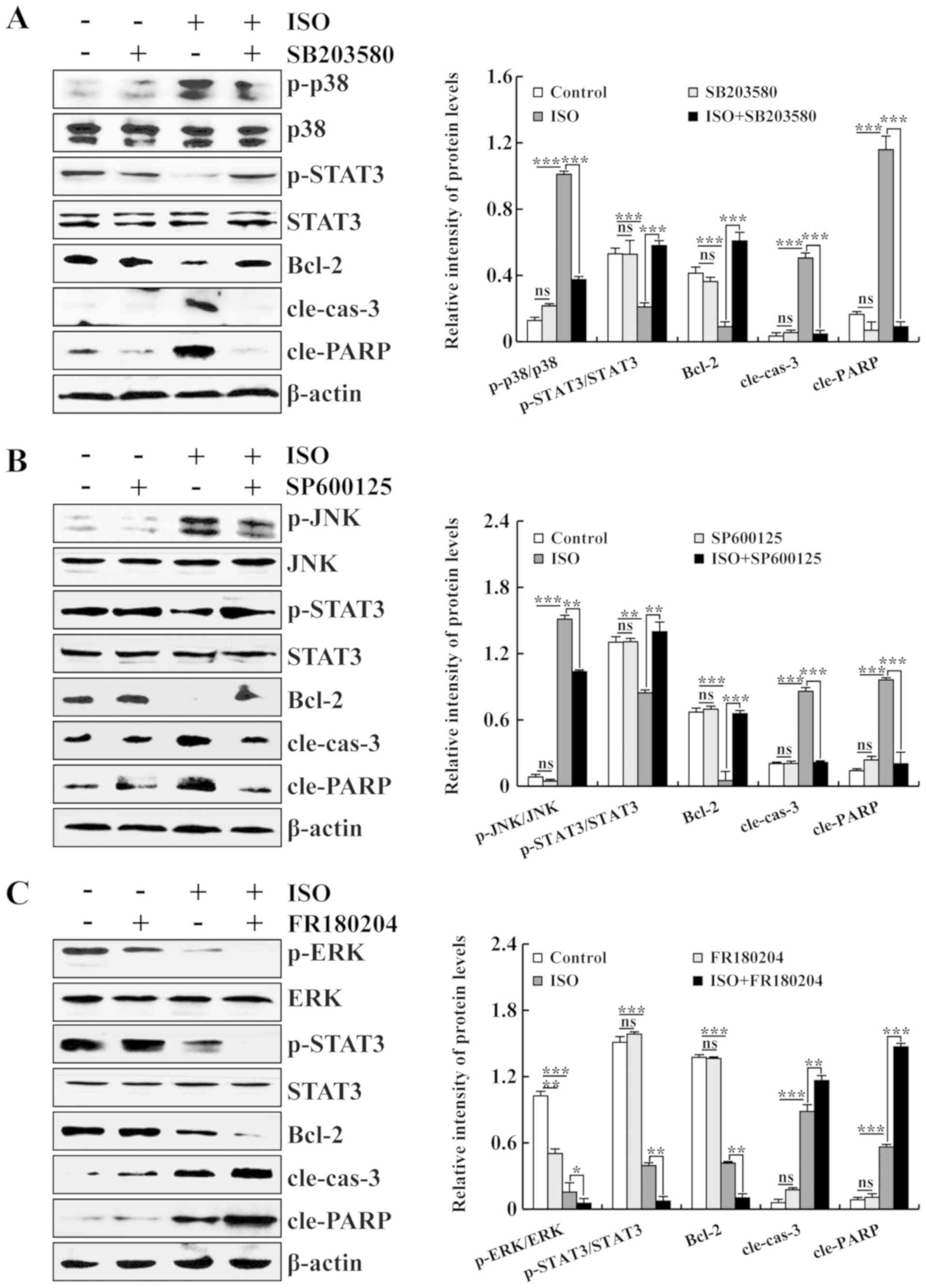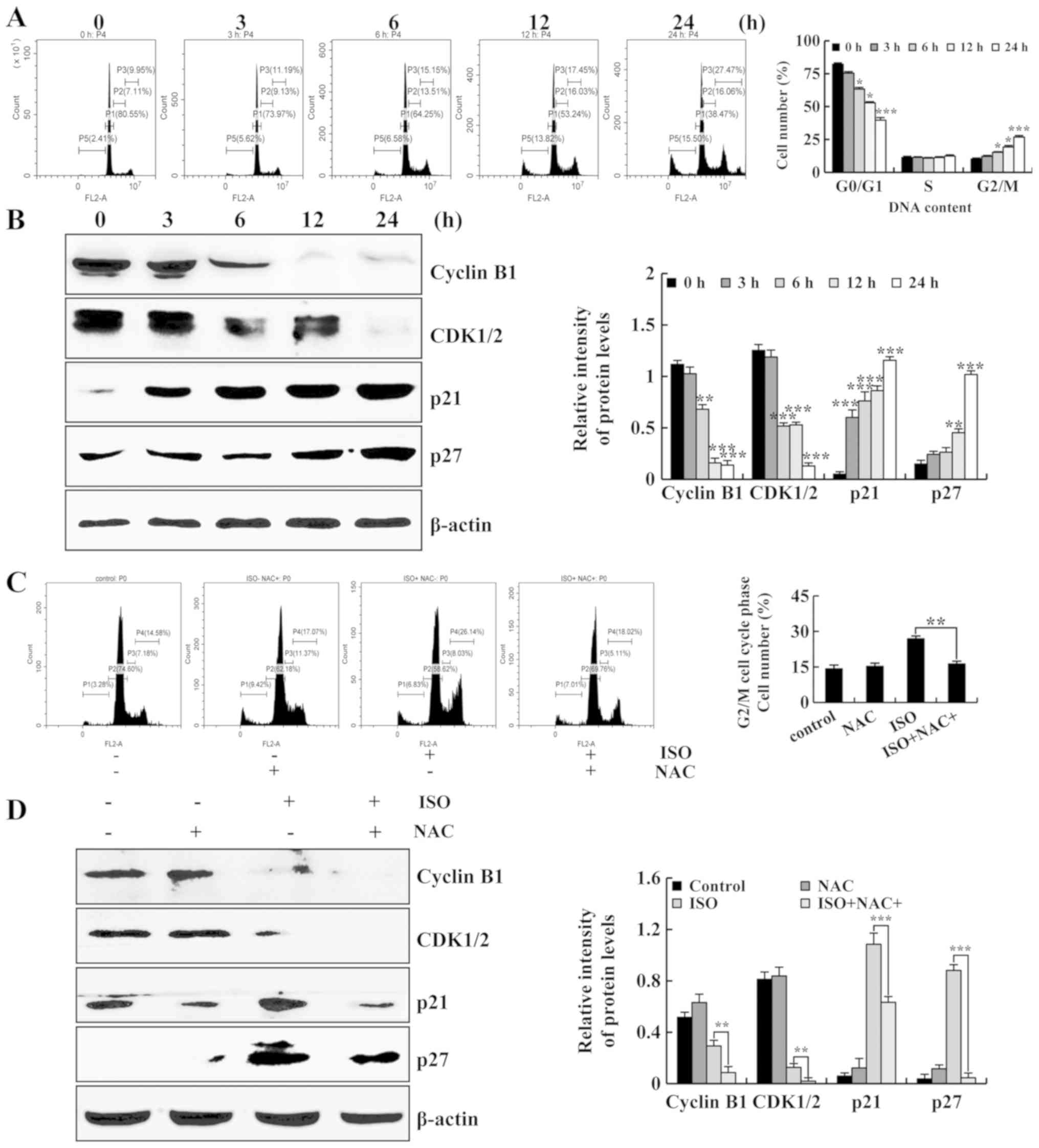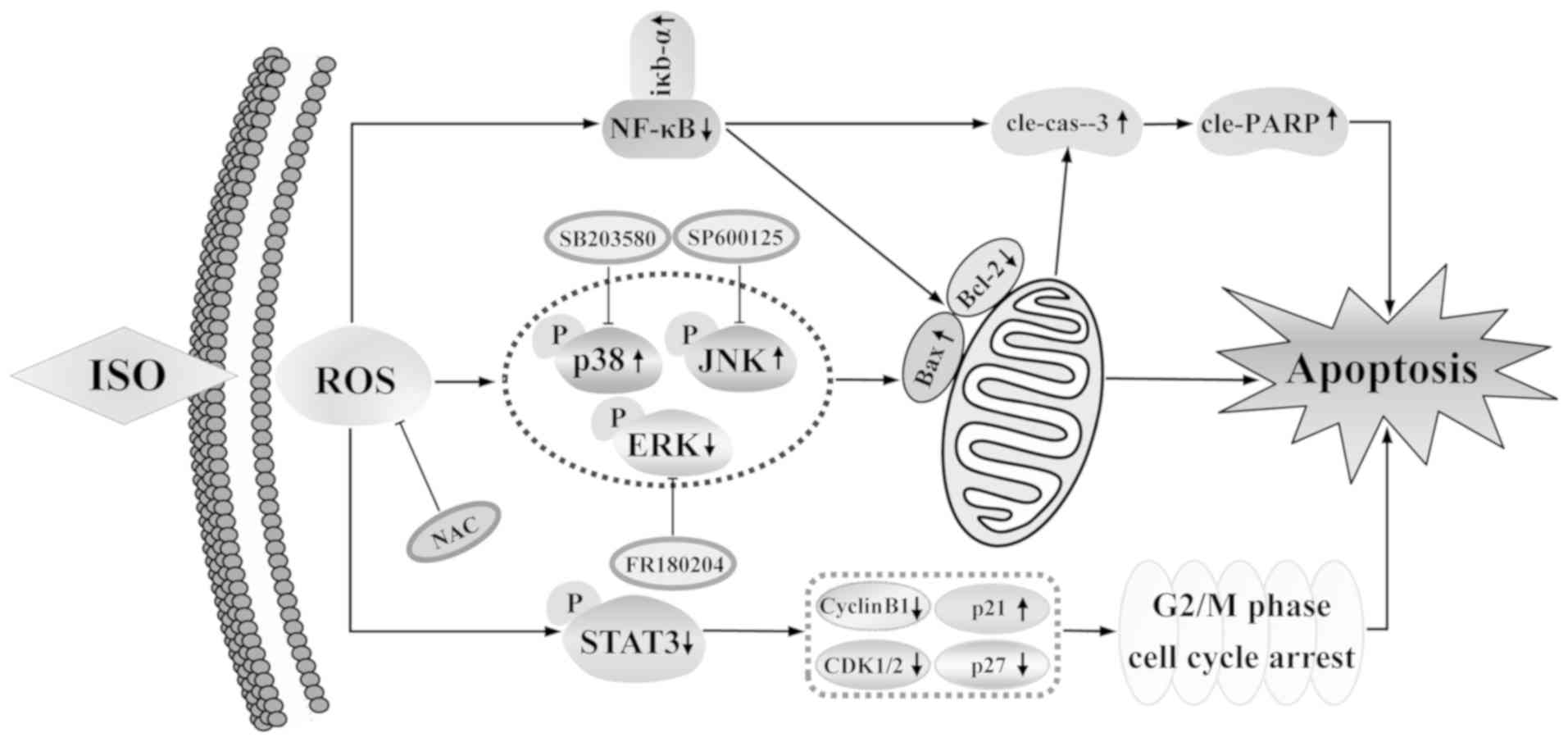|
1
|
Bray F, Ferlay J, Soerjomataram I, Siegel
RL, Torre LA and Jemal A: Global cancer statistics 2018: GLOBOCAN
estimates of incidence and mortality worldwide for 36 cancers in
185 countries. CA Cancer J Clin. 68:394–424. 2018. View Article : Google Scholar : PubMed/NCBI
|
|
2
|
Reinmuth N, Gröschel A, Schumann C,
Sebastian M, Wiewrodt R and Reck M: Updated recommendation for
treatment of metastatic non-small cell lung cancer. Pneumologie.
72:138–154. 2018.In German.
|
|
3
|
Xu Z, Mei J and Tan Y: Baicalin attenuates
DDP (cisplatin) resistance in lung cancer by downregulating MARK2
and p-Akt. Int J Oncol. 50:93–100. 2017. View Article : Google Scholar
|
|
4
|
Zhou Y and Ho WS: Combination of
liquiritin, isoliquiritin and isoliquirigenin induce apoptotic cell
death through upregulating p53 and p21 in the A549 non-small cell
lung cancer cells. Oncol Rep. 31:298–304. 2014. View Article : Google Scholar
|
|
5
|
Elango R1, Athinarayanan J, Subbarayan VP,
Lei DKY and Alshatwi AA: Hesperetin induces an apoptosis-triggered
extrinsic pathway and a p53-independent pathway in human lung
cancer H522 cells. J Asian Nat Prod Res. 6:559–569. 2018.
View Article : Google Scholar
|
|
6
|
Chang JH, Lai SL, Chen WS, Hung WY, Chow
JM, Hsiao M, Lee WJ and Chien MH: Quercetin suppresses the
metastatic ability of lung cancer through inhibiting
Snail-dependent Akt activation and Snail-independent ADAM9
expression pathways. Biochim Biophys Acta Mol Cell Res.
1864:1746–1758. 2017. View Article : Google Scholar : PubMed/NCBI
|
|
7
|
Zhang DX and Gutterman DD: Mitochondrial
reactive oxygen species-mediated signaling in endothelial cells. Am
J Physiol Heart Circ Physiol. 292:H2023–H2031. 2007. View Article : Google Scholar : PubMed/NCBI
|
|
8
|
Zhang W and Liu HT: MAPK signal pathways
in the regulation of cell proliferation in mammalian cells. Cell
Res. 12:9–18. 2002. View Article : Google Scholar : PubMed/NCBI
|
|
9
|
Sheng W, Chen C, Dong M, Wang G, Zhou J,
Song H, Li Y, Zhang J and Ding S: Calreticulin promotes EGF-induced
EMT in pancreatic cancer cells via Integrin/EGFR-ERK/MAPK signaling
pathway. Cell Death Dis. 8:pp. e31472017, View Article : Google Scholar : PubMed/NCBI
|
|
10
|
Yu H, Lee H, Herrmann A, Buettner R and
Jove R: Revisiting STAT3 signalling in cancer: New and unexpected
biological functions. Nat Rev Cancer. 14:736–746. 2014. View Article : Google Scholar : PubMed/NCBI
|
|
11
|
Nguyen TT, Ung TT, Li S, Lian S, Xia Y,
Park SY and Do Jung Y: Metformin inhibits lithocholic acid-induced
interleukin 8 upregulation in colorectal cancer cells by
suppressing ROS production and NF-kB activity. Sci Rep. 9:20032019.
View Article : Google Scholar : PubMed/NCBI
|
|
12
|
Wu D, Zhou WY, Lin XT, Fang L and Xie CM:
Bufalin induces apoptosis via mitochondrial ROS-mediated caspase-3
activation in HCT-116 and SW620 human colon cancer cells. Drug Chem
Toxicol. 42:444–450. 2019. View Article : Google Scholar : PubMed/NCBI
|
|
13
|
Xu WT, Shen GN, Luo YH, Piao XJ, Wang JR,
Wang H, Zhang Y, Li JQ, Feng YC, Zhang Y, et al: New naphthalene
derivatives induce human lung cancer A549 cell apoptosis via
ROS-mediated MAPKs, Akt, and STAT3 signaling pathways. Chem Biol
Interact. 304:148–157. 2019. View Article : Google Scholar : PubMed/NCBI
|
|
14
|
Wang JR, Shen GN, Luo YH, Piao XJ, Shen M,
Liu C, Wang Y, Meng LQ, Zhang Y, Wang H, et al: The compound
2-(naphthalene-2-thio)-5,8-dimethoxy-1,4-naphthoquinone induces
apoptosis via reactive oxygen species-regulated mitogen-activated
protein kinase, protein kinase B, and signal transducer and
activator of transcription 3 signaling in human gastric cancer
cells. Drug Dev Res. 79:295–306. 2018. View Article : Google Scholar : PubMed/NCBI
|
|
15
|
Xiang Y, Ye W, Huang C, Lou B, Zhang J, Yu
D, Huang X, Chen B and Zhou M: Brusatol inhibits growth and induces
apoptosis in pancreatic cancer cells via JNK/p38
MAPK/NF-κb/Stat3/Bcl-2 signaling pathway. Biochem Biophys Res
Commun. 487:820–826. 2017. View Article : Google Scholar : PubMed/NCBI
|
|
16
|
Peng J, Fan G, Hong Z, Chai Y and Wu Y:
Preparative separation of isovitexin and isoorientin from Patrinia
villosa Juss by high-speed counter-current chromatography. J
Chromatogr A. 1074:111–115. 2005. View Article : Google Scholar : PubMed/NCBI
|
|
17
|
Prinz S, Ringl A, Huefner A, Pemp E and
Kopp B: 4'''-Acetylvitexin-2''-O-rhamnoside, isoorientin, orientin,
and 8-methoxykaempferol-3-O-glucoside as markers for the
differentiation of Crataegus monogyna and Crataegus pentagyna from
Crataegus laevigata (Rosaceae). Chem Biodivers. 4:2920–2931. 2007.
View Article : Google Scholar : PubMed/NCBI
|
|
18
|
Budzianowski J, Budzianowska A and Kromer
K: Naphthalene glucoside and other phenolics from the shoot and
callus cultures of Drosophyllum lusitanicum. Phytochemistry.
61:421–425. 2002. View Article : Google Scholar : PubMed/NCBI
|
|
19
|
Yuan L, Li X, He S, Gao C, Wang C and Shao
Y: Effects of natural flavonoid isoorientin on growth performance
and gut microbiota of mice. J Agric Food Chem. 66:9777–9784. 2018.
View Article : Google Scholar : PubMed/NCBI
|
|
20
|
Yuan L, Wu Y, Ren X, Liu Q, Wang J and Liu
X: Isoorientin attenuates lipopolysaccharide-induced
pro-inflammatory responses through down-regulation of ROS-related
MAPK/NF-κB signaling pathway in BV-2 microglia. Mol Cell Biochem.
386:153–165. 2014. View Article : Google Scholar
|
|
21
|
Lee W, Ku SK and Bae JS: Vascular barrier
protective effects of orientin and isoorientin in LPS-induced
inflammation in vitro and in vivo. Vascul Pharmacol. 62:3–14. 2014.
View Article : Google Scholar : PubMed/NCBI
|
|
22
|
Gundogdu G, Dodurga Y, Elmas L, Tasci SY
and Karaoglan ES: Investigation of the anticancer mechanism of
isoorientin isolated from Eremurus spectabilis leaves via cell
cycle pathways in HT-29 human colorectal adenocarcinoma cells.
Eurasian J Med. 50:168–172. 2018. View Article : Google Scholar : PubMed/NCBI
|
|
23
|
Daniel B, Longley, Harkin D Paul and
Johnston Patrick G: 5-fluorouracil: Mechanisms of Action and
Clinical Strategies. Nat Rev Cancer. 5:330–338. 2003.
|
|
24
|
Dasari S and Tchounwou PB: Cisplatin in
cancer therapy: Molecular mechanisms of action. Eur J Pharmacol.
740:364–378. 2014. View Article : Google Scholar : PubMed/NCBI
|
|
25
|
Rashed KN, Ćirić A, Glamočlija J, Calhelha
RC, Ferreira IC and Soković M: Antimicrobial activity, growth
inhibition of human tumour cell lines, and phytochemical
characterization of the hydromethanolic extract obtained from
Sapindus saponaria L. aerial parts BioMed Res Int.
2013:6591832013.
|
|
26
|
Li L, Henry GE and Seeram NP:
Identification and bioactivities of resveratrol oligomers and
flavonoids from Carex folliculata seeds. J Agric Food Chem.
57:7282–7287. 2009. View Article : Google Scholar : PubMed/NCBI
|
|
27
|
Yuan L, Wang J, Xiao H, Xiao C, Wang Y and
Liu X: Isoorientin induces apoptosis through mitochondrial
dysfunction and inhibition of PI3K/Akt signaling pathway in HepG2
cancer cells. Toxicol Appl Pharmacol. 265:83–92. 2012. View Article : Google Scholar : PubMed/NCBI
|
|
28
|
Czemplik M, Mierziak J, Szopa J and Kulma
A: Flavonoid C-glucosides derived from flax straw extracts reduce
human breast cancer cell growth in vitro and induce apoptosis.
Front Pharmacol. 7:282–295. 2016. View Article : Google Scholar : PubMed/NCBI
|
|
29
|
Lin X, Wei J, Chen Y, He P, Lin J, Tan S,
Nie J, Lu S, He M, Lu Z, et al: Isoorientin from Gypsophila elegans
induces apoptosis in liver cancer cells via mitochondrial-mediated
pathway. J Ethnopharmacol. 187:187–194. 2016. View Article : Google Scholar : PubMed/NCBI
|
|
30
|
Vadde R, Radhakrishnan S, Reddivari L and
Vanamala JK: Triphala extract suppresses proliferation and induces
apoptosis in human colon cancer stem cells via suppressing
c-Myc/Cyclin D1 and elevation of Bax/Bcl-2 ratio. BioMed Res Int.
2015:6492632015. View Article : Google Scholar : PubMed/NCBI
|
|
31
|
Ye T, Su J, Huang C, Yu D, Dai S, Huang X,
Chen B and Zhou M: Isoorientin induces apoptosis, decreases
invasiveness, and downregulates VEGF secretion by activating AMPK
signaling in pancreatic cancer cells. OncoTargets Ther.
9:7481–7492. 2016. View Article : Google Scholar
|
|
32
|
Yuan L, Wang J, Xiao H, Wu W, Wang Y and
Liu X: MAPK signaling pathways regulate mitochondrial-mediated
apoptosis induced by isoorientin in human hepatoblastoma cancer
cells. Food Chem Toxicol. 53:62–68. 2013. View Article : Google Scholar
|
|
33
|
Yuan L, Wang Y, Wang J, Xiao H and Liu X:
Additive effect of zinc oxide nanoparticles and isoorientin on
apoptosis in human hepatoma cell line. Toxicol Lett. 225:294–304.
2014. View Article : Google Scholar : PubMed/NCBI
|
|
34
|
Yuan L, Wei S, Wang J and Liu X:
Isoorientin induces apoptosis and autophagy simultaneously by
reactive oxygen species (ROS)-related p53, PI3K/Akt, JNK, and p38
signaling pathways in HepG2 cancer cells. J Agric Food Chem.
62:5390–5400. 2014. View Article : Google Scholar : PubMed/NCBI
|
|
35
|
Na D, Song Y, Jiang CG, Sun Z, Xu YY, Wang
ZN, Zhao ZZ and Xu HM: Induction of apoptosis in human peritoneal
mesothelial cells by gastric cancer cell supernatant promotes
peritoneal carcinomatosis. Tumour Biol. 35:8301–8307. 2014.
View Article : Google Scholar : PubMed/NCBI
|
|
36
|
Morales-Cruz M, Figueroa CM,
González-Robles T, Delgado Y, Molina A, Méndez J, Morales M and
Griebenow K: Activation of caspase-dependent apoptosis by
intracellular delivery of Cytochrome c-based nanoparticles. J
Nanobiotechnology. 12:332014. View Article : Google Scholar : PubMed/NCBI
|
|
37
|
Zhang M, Zheng J, Nussinov R and Ma B:
Release of cytochrome c from bax pores at the mitochondrial
membrane. Sci Rep. 7:26352017. View Article : Google Scholar : PubMed/NCBI
|
|
38
|
Shimizu S, Narita M and Tsujimoto Y and
Tsujimoto Y: Bcl-2 family proteins regulate the release of
apoptogenic cytochrome c by the mitochondrial channel VDAC. Nature.
399:483–487. 1999. View
Article : Google Scholar : PubMed/NCBI
|
|
39
|
Oltvai ZN, Milliman CL and Korsmeyer SJ:
Bcl-2 heterodimerizes in vivo with a conserved homolog, Bax, that
accelerates programmed cell death. Cell. 74:609–619. 1993.
View Article : Google Scholar : PubMed/NCBI
|
|
40
|
Korsmeyer SJ: BCL-2 gene family and the
regulation of programmed cell death. Cancer Res. 59(Suppl):
1693s–1700s. 1999.PubMed/NCBI
|
|
41
|
Park SG, Kim SH, Kim KY, Yu SN, Choi HD,
Kim YW, Nam HW, Seo YK and Ahn SC: Toyocamycin induces apoptosis
via the crosstalk between reactive oxygen species and p38/ERK MAPKs
signaling pathway in human prostate cancer PC-3 cells. Pharmacol
Rep. 69:90–96. 2017. View Article : Google Scholar
|
|
42
|
Chen X and Chen J: miR-3188 Regulates Cell
Proliferation, Apoptosis, and Migration in Breast Cancer by
Targeting TUSC5 and Regulating the p38 MAPK Signaling Pathway.
Oncol Res. 26:363–372. 2018. View Article : Google Scholar
|
|
43
|
Zou F, Mao R, Yang L, Lin S, Lei K, Zheng
Y, Ding Y, Zhang P, Cai G, Liang X, et al: Targeted deletion of
miR-139-5p activates MAPK, NF-κB and STAT3 signaling and promotes
intestinal inflammation and colorectal cancer. FEBS J.
283:1438–1452. 2016. View Article : Google Scholar : PubMed/NCBI
|
|
44
|
Meng LQ, Liu C, Luo YH, Piao XJ, Wang Y,
Zhang Y, Wang JR, Wang H, Xu WT, Liu Y, et al: Quinalizarin exerts
an anti-tumour effect on lung cancer A549 cells by modulating the
Akt, MAPK, STAT3 and p53 signalling pathways. Mol Med Rep.
17:2626–2634. 2018.
|
|
45
|
Hwang HS, Park SJ, Lee MH and Kim HA:
MicroRNA-365 regulates IL-1β-induced catabolic factor expression by
targeting HIF-2α in primary chondrocytes. Sci Rep. 7:178892017.
View Article : Google Scholar
|
|
46
|
Fu Y, O'Connor LM, Shepherd TG and
Nachtigal MW: The p38 MAPK inhibitor, PD169316, inhibits
transforming growth factor beta-induced Smad signaling in human
ovarian cancer cells. Biochem Biophys Res Commun. 310:391–397.
2003. View Article : Google Scholar : PubMed/NCBI
|
|
47
|
Hour MJ, Lee KT, Wu YC, Wu CY, You BJ,
Chen TL and Lee HZ: A novel antitubulin agent, DPQZ, induces cell
apoptosis in human oral cancer cells through Ras/Raf inhibition and
MAP kinases activation. Arch Toxicol. 87:835–846. 2013. View Article : Google Scholar
|
|
48
|
Ito K, Matsuzaki M, Sasahara T, Shin M and
Yayama K: Orthovanadate-Induced Vasoconstriction of Rat Mesenteric
Arteries Is Mediated by Rho Kinase-Dependent Inhibition of Myosin
Light Chain Phosphatase. Biol Pharm Bull. 38:1809–1816. 2015.
View Article : Google Scholar : PubMed/NCBI
|
|
49
|
Yang S, Zhang H, Yang X, Zhu Y and Zhang
M: Evaluation of antioxidative and antitumor activities of
extracted flavonoids from Pink Lady apples in human colon and
breast cancer cell lines. Food Funct. 6:3789–3798. 2015. View Article : Google Scholar : PubMed/NCBI
|
|
50
|
Wang Y, Qian J, Cao J, Wang D, Liu C, Yang
R, Li X and Sun C: Antioxidant capacity, anticancer ability and
flavonoids composition of 35 citrus (Citrus reticulata Blanco)
varieties. Molecules. 22:E11142017. View Article : Google Scholar : PubMed/NCBI
|
|
51
|
Zuo D, Zhou Z, Wang H, Zhang T, Zang J,
Yin F, Sun W, Chen J, Duan L, Xu J, et al: Alternol, a natural
compound, exerts an anti-tumour effect on osteosarcoma by
modulating of STAT3 and ROS/MAPK signalling pathways. J Cell Mol
Med. 21:208–221. 2017. View Article : Google Scholar
|
|
52
|
Meng LQ, Wang Y, Luo YH, Piao XJ, Liu C,
Wang Y, Zhang Y, Wang JR, Wang H, Xu WT, et al: Quinalizarin
induces apoptosis through reactive oxygen species (ROS)-mediated
mitogen-activated protein kinase (MAPK) and signal transducer and
activator of transcription 3 (STAT3) signaling pathways in
colorectal cancer cells. Med Sci Monit. 24:3710–3719. 2018.
View Article : Google Scholar : PubMed/NCBI
|
|
53
|
Liu C, Shen GN, Luo YH, Piao XJ, Jiang XY,
Meng LQ, Wang Y, Zhang Y, Wang JR, Wang H, et al: Novel
1,4-naphthoquinone derivatives induce apoptosis via ROS-mediated
p38/MAPK, Akt and STAT3 signaling in human hepatoma Hep3B cells.
Int J Biochem Cell Biol. 96:9–19. 2018. View Article : Google Scholar : PubMed/NCBI
|
|
54
|
Cheng CW, Leong KW, Ng YM, Kwong YL and
Tse E: The peptidyl-prolyl isomerase PIN1 relieves cyclin-dependent
kinase 2 (CDK2) inhibition by the CDK inhibitor p27. J Biol Chem.
292:21431–21441. 2017. View Article : Google Scholar : PubMed/NCBI
|
|
55
|
Bonelli P, Tuccillo FM, Borrelli A,
Schiattarella A and Buonaguro FM: CDK/CCN and CDKI alterations for
cancer prognosis and therapeutic predictivity. BioMed Res Int.
2014:3610202014. View Article : Google Scholar : PubMed/NCBI
|
|
56
|
Sarita Rajender P, Ramasree D, Bhargavi K,
Vasavi M and Uma V: Selective inhibition of proteins regulating
CDK/cyclin complexes: Strategy against cancer - a review. J Recept
Signal Transduct Res. 30:206–213. 2010. View Article : Google Scholar : PubMed/NCBI
|















